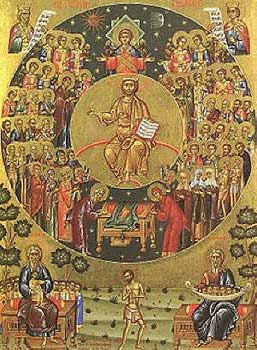
The Monk Doulos the Passion-Bearer ( the time of his life is unknown), was a monk at one of the Egyptian monasteries. He distinguished himself by his meekness, humility and obedience. During the course of 20 years the monk endured the mockery, abuse and contempt of several of the monastic brethren. At first it was difficult for him to bear the deed of forbearance and humbly endure the insult, but continually humbling himself in soul and praying to God, he reached such a degree of passivity, that with all his heart he pitied his detractors and prayed for them.
At the end of his life the monk underwent temptation: a certain monk from among the brethren pilfered church vessels and hid them. When the hegumen and elders of the monastery started to sort out the details of the theft, they suspected Saint Doulos enough to assert that he had done the thievery, since on the day of the misdeed he had not appeared at the vigil service, although before this he had always come to church. Concerning this occurrence, on that day Saint Doulos was ill and not able to come to services. They led Saint Doulos to the elders, to whom he said that he was not guilty of the theft. But his enemies began to slander him, saying that they were witnesses. Convinced that they did not believe his words, the Monk Doulos did not argue but said: "Forgive me, holy fathers, I am a sinner". The hegumen gave orders to strip off the monastic garb and to dress him in worldly clothes. Sobbing bitterly, Saint Doulos prayed: "Lord Jesus Christ, Son of God, because of Thy Holy Name I clothed myself in monastic form, but now, through my sins, it is stripped from me".
They put chains on the Monk Doulos, and the steward was nasty in demanding where were the church vessels hidden, but the innocent passion-bearer only repeated: "Forgive me, I have sinned". They then turned him over for trial to the civil authorities and subjected him to torture, but the saint repeated: "I have neither silver, nor the lost vessels". The city eparch asked the monks what to do with him, having delivered him over to the secular court. They answered: "Do with him as the laws prescribe". The saint was sentenced to have both his hands cut off. Before the execution of the sentence the governor asked the monk: "Tell us where the vessels are and thou shalt be free of execution". The saint answered: "Governor, thou wantest that I tell about myself something that I did not do? I do not want to tell lies about myself, since every lie is from the devil". They took the saint to the place of execution. Then finally, the perpetrator of the theft experienced remorse and went to the hegumen, asking that the execution be stopped.
They took the monk back to the monastery. The monks began to ask forgiveness of the saint, and not only did he not bear them malice, but also he was grateful, that they had given him the opportunity by guiltless suffering to efface transgressions done by him. The saint asked the Lord to pardon his accusers. After three days they found the monk having expired to God while kneeling at prayer. The burial was delayed until the arrival of the hegumen and brethren of a nearby monastery. The body of the saint was locked up under key in the cathedral. When all had gathered and gone into the church, the body of the guiltless passion-bearer was not in the cathedral, and there remained only his clothes and sandals.
Those, who had accused the Monk Doulos of sin, were shewn unworthy to give his body over to burial.
 The Monk Doulos the Passion-Bearer ( the time of his life is unknown), was a monk at one of the Egyptian monasteries. He distinguished himself by his meekness, humility and obedience. During the course of 20 years the monk endured the mockery, abuse and contempt of several of the monastic brethren. At first it was difficult for him to bear the deed of forbearance and humbly endure the insult, but continually humbling himself in soul and praying to God, he reached such a degree of passivity, that with all his heart he pitied his detractors and prayed for them.
The Monk Doulos the Passion-Bearer ( the time of his life is unknown), was a monk at one of the Egyptian monasteries. He distinguished himself by his meekness, humility and obedience. During the course of 20 years the monk endured the mockery, abuse and contempt of several of the monastic brethren. At first it was difficult for him to bear the deed of forbearance and humbly endure the insult, but continually humbling himself in soul and praying to God, he reached such a degree of passivity, that with all his heart he pitied his detractors and prayed for them.